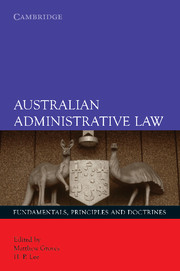Book contents
- Frontmatter
- Contents
- Foreword
- Preface
- About the contributors
- Table of cases
- Table of statutes
- 1 Australian administrative law: The constitutional and legal matrix
- 2 Administrative law in Australia: Themes and values
- 3 The public/private distinction in Australian administrative law
- 4 Australian administrative law: The human rights dimension
- 5 Administrative tribunals
- 6 Australian Ombudsman: A continual work in progress
- 7 Freedom of information
- 8 Delegated legislation
- 9 The concept of ‘justiciability’ in administrative law
- 10 Standing
- 11 Reasons for administrative decisions: Legal framework and reform
- 12 Relevant and irrelevant considerations
- 13 Improper purpose
- 14 Reasonableness, rationality and proportionality
- 15 The ‘no evidence’ rule
- 16 Failure to exercise discretion or perform duties
- 17 Procedural fairness: The hearing rule
- 18 The doctrine of substantive unfairness and the review of substantive legitimate expectations
- 19 The impact and significance of Teoh and Lam
- 20 The rule against bias
- 21 Jurisdictional error without the tears
- 22 Privative clauses and the limits of the law
- 23 Administrative law judicial remedies
- Endnotes
- Index
21 - Jurisdictional error without the tears
Published online by Cambridge University Press: 05 June 2012
- Frontmatter
- Contents
- Foreword
- Preface
- About the contributors
- Table of cases
- Table of statutes
- 1 Australian administrative law: The constitutional and legal matrix
- 2 Administrative law in Australia: Themes and values
- 3 The public/private distinction in Australian administrative law
- 4 Australian administrative law: The human rights dimension
- 5 Administrative tribunals
- 6 Australian Ombudsman: A continual work in progress
- 7 Freedom of information
- 8 Delegated legislation
- 9 The concept of ‘justiciability’ in administrative law
- 10 Standing
- 11 Reasons for administrative decisions: Legal framework and reform
- 12 Relevant and irrelevant considerations
- 13 Improper purpose
- 14 Reasonableness, rationality and proportionality
- 15 The ‘no evidence’ rule
- 16 Failure to exercise discretion or perform duties
- 17 Procedural fairness: The hearing rule
- 18 The doctrine of substantive unfairness and the review of substantive legitimate expectations
- 19 The impact and significance of Teoh and Lam
- 20 The rule against bias
- 21 Jurisdictional error without the tears
- 22 Privative clauses and the limits of the law
- 23 Administrative law judicial remedies
- Endnotes
- Index
Summary
‘Jurisdictional error’ is a term which has puzzled many people. Kirby J thinks it is useless at best, and retrograde at worst:
In England, the former distinction between jurisdictional and non-jurisdictional error, once of great significance in cases concerned with the prerogative writs, has now been abandoned. The precise scope of error classified as ‘jurisdictional’ was always uncertain. In contemporary Australian law, the boundary between error regarded as ‘jurisdictional’ and error viewed as ‘non-jurisdictional’ is, to say the least, often extremely difficult to find.
… Once it is appreciated that the [constitutional] writs … are distinct, are not confined to their historical provenance, have high constitutional purposes in Australia and may adapt over time within the limits of their essential characteristics, the old insistence upon preserving the chimerical distinction between jurisdictional and non-jurisdictional error of law might be interred, without tears, in Australia as has happened elsewhere.
The term once had a strict meaning, back in the mid-sixteenth century. However, its vast expansion of scope and meaning over the course of the twentieth century means that it now conveys no meaning whatsoever as to how it was reached, but only as to what will be likely to follow, if it has indeed been reached. Specifically, there are numerous different pathways towards ‘jurisdictional error’, but usually only one route away from it. In other words, it is both a conclusory term and a point of departure.
There was more to Kirby J's protest than semantics.
- Type
- Chapter
- Information
- Australian Administrative LawFundamentals, Principles and Doctrines, pp. 330 - 344Publisher: Cambridge University PressPrint publication year: 2007
- 5
- Cited by



